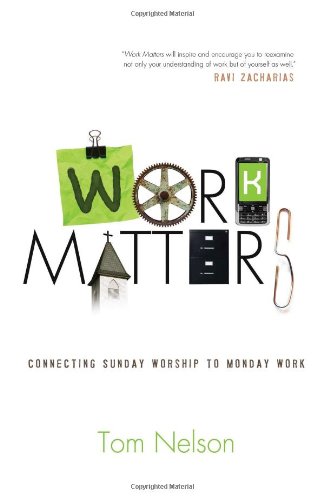A Brief Book Summary from Books At a Glance
By Paul Reese
About the Author
Tom Nelson is the Senior Pastor at Christ Community Church in Kansas City. He is the president of Made to Flourish (a network for pastors) and serves on the boards of The Gospel Coalition and Trinity International University.
Overview
Christians tend to create a gap between their understanding of God and their daily vocation. Nelson calls this gap the dichotomy between Sunday church and Monday work. This book helps remove the “fog” keeping Christians from clearly seeing how to bridge this gap by discovering the biblical teaching of how God uses work to fulfill divine, gospel, purposes. Understanding that vocation is a divine calling happens in two ways; one—by learning a biblical theology of work, and two—by applying that biblical understanding of work to seamlessly integrate faith with work.
Between each chapter are personal stories of how God has used vocation to fulfill His gospel purposes. The jobs featured in these stories range from stay-at-home moms to chief executive officers. Also featured at the end of each chapter are discussion questions for personal evaluation and group interaction.
Table of Contents
Introduction: Connecting Sunday to Monday
Created to Work
Is Work a Four-Letter Word?
The Good News of Work
Work Now and Later
Extraordinary Ordinary Work
The Transforming Power of Work
Work and the Common Good
Gifted for Work
Facing Challenges in Our Work
The Church at Work
Summary
Chapter 1: Created to Work
As the crown of God’s creation, people are created to take dominion over the earth as God’s image bearers. Just as a little boy resembles his father, all people are crafted by God to reflect God’s characteristics. Part of reflecting God’s character is working as God works. In other words, God created people with work in mind. Understanding work biblically means knowing work is not primarily about earning money, “but about God-honoring human creativity and contribution” (p. 24).
A theological framework is necessary for valuing work as God does. This means understanding God designed people to see work as a divine calling to joyfully add to creation. This means having a posture of cultivation and creativity to steward the resources of the world through work. Examples of this in the OT come from the use of the word avodah, which means “to cultivate.” When Solomon dedicated the temple, he used this word to describe how the priests and Levites served in leading corporate worship. This kind of cultivation (avodah) makes work an act of worship.
For the Christian, work should not be separated from worship. How one speaks about work reveals whether one is trying to make a living, or honor God in their vocation. Christians should see their work as being for an “audience of one,” meaning as a service to God alone. Though sin makes work difficult, good and successful work is possible when Christians use their work as an opportunity to glorify God.
Chapter 2: Is Work a Four-Letter Word?
Genesis 3 explains why work seems such a “curse” – sin has made it so. Adam and Eve were created to be cultivators and creators, but when they chose to believe Satan, they lost the privilege of working in the garden. The impact of sin upon work “reveals far-reaching and long-lasting changes regarding work” (p. 37-38). “Work has become a heavy yoke that humans were not originally designed to bear” (p. 38). When one experiences a job less than desirable, or ruthless competition in the workplace, or lack of morale in their work, all these experiences are because of the pain sin creates in one’s work.
Another impact of sin on work is sin’s power to make work meaningless. In many workplaces today, workers do not have direct contact with those who benefit from their work, causing workers to question how meaningful their work can be. The book of Ecclesiastes reminds one that the pursuit of satisfaction in work can be in vain unless work is seen as a gift from God.
Not only does sin make one see work as meaningless, but can also turn one’s work into an idol. Devotion to work can be an endless pursuit at the expense of physical and relational. . .
[To continue reading this summary, please see below....]The remainder of this article is premium content. Become a member to continue reading.
Already have an account? Sign In
